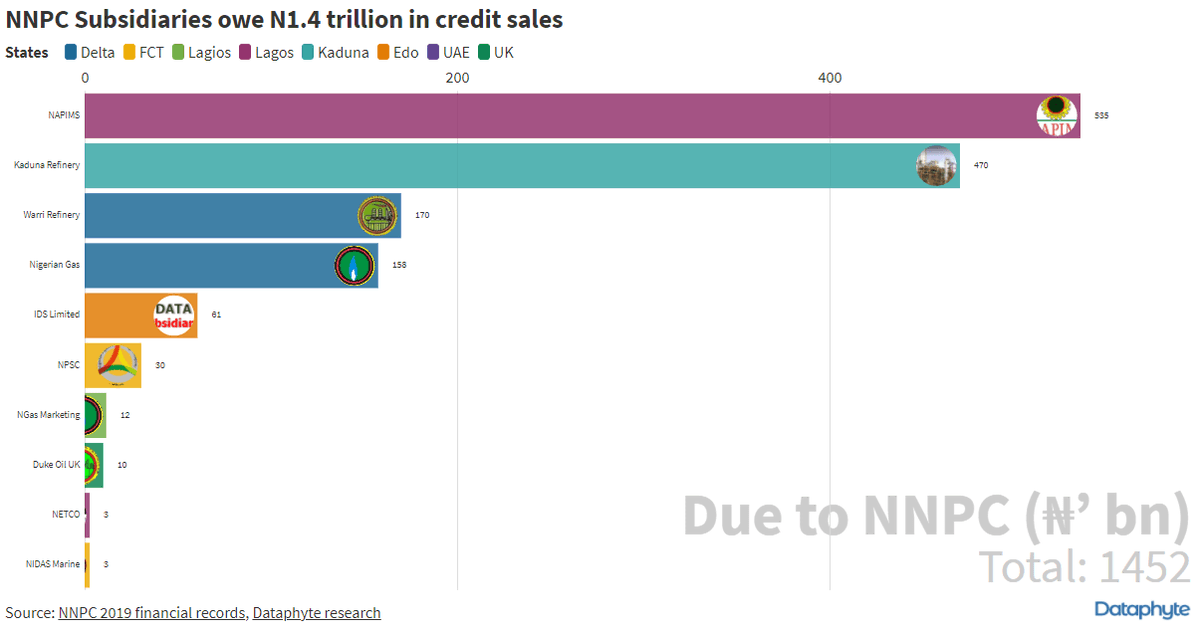
Or maybe it is a case of if Nigeria doesn't kill NNPC, NNPC will kill Nigeria.
Did you know that quarter of the subsidiaries’ debts could have helped Nigeria to clean up the oil spills that plagues human & marine life in Ogoni land?
{A SADDER Thread}
#NNPCAuditReport
Did you know that quarter of the subsidiaries’ debts could have helped Nigeria to clean up the oil spills that plagues human & marine life in Ogoni land?
{A SADDER Thread}
#NNPCAuditReport
https://twitter.com/sheiduhabib_/status/1371749822974328832
The United Nations Environment Programme (UNEP) estimates that the Ogoni cleanup will cost an initial $1 billion which (at the time of their report) amounts to N394.74 billion 🤯
#NNPCAuditReport
#NNPCAuditReport
The huge amount of unpaid debts by NNPC’s subsidiaries can significantly reduce the country’s rising debt profile & also form a substantial part of Nigeria’s annual budgets.
#NNPCAuditReport
#NNPCAuditReport

The Bretton Wood Institution has previously advised the country to perform “major policy adjustments necessary to contain short-term vulnerabilities, build resilience & unlock growth potential.”
#NNPCAuditReport
#NNPCAuditReport
NNPC’s ₦1.4 trillion credit sales tie down much-needed revenue by the government. In 2020, the International Monetary Fund (IMF) described high fiscal deficits as complicating Nigeria’s monetary policy
#NNPCAuditReport
#NNPCAuditReport
As of the 3rd quarter of 2020, Nigeria’s debt profile stood at ₦32.22 trillion. To ensure financial flexibility, Nigeria needs to increase revenue by operating a viable & profitable firm.
#NNPCAuditReport
#NNPCAuditReport
The importance of an effective & properly managed National Oil Firm cannot be underplayed in a country like Nigeria that relies on the oil sector for 95% of foreign exchange earnings, 80% of her budgetary revenues & 65% of government earnings.
#NNPCAuditReport
#NNPCAuditReport
An effective & properly managed National Oil Firm will provide the country with the much needed revenue to bridge its infrastructural deficit.
#NNPCAuditReport
#NNPCAuditReport
A quick passage of the much awaited Petroleum Industry Bill (PIB) can eliminate these revenue shortages from the Oil Sector by repositioning the NNPC tonne efficient run, thereby providing the template for restructuring the Oil & Gas industry
#NNPCAuditReport
#NNPCAuditReport
It is no hyperbole to say "a properly & effectively managed national oil firm can increase the quality of life in Nigeria".
The oil sector (if managed & run efficiently) can fund the government's provision of improved infrastructure across the country.
#NNPCAuditReport
The oil sector (if managed & run efficiently) can fund the government's provision of improved infrastructure across the country.
#NNPCAuditReport
• • •
Missing some Tweet in this thread? You can try to
force a refresh




